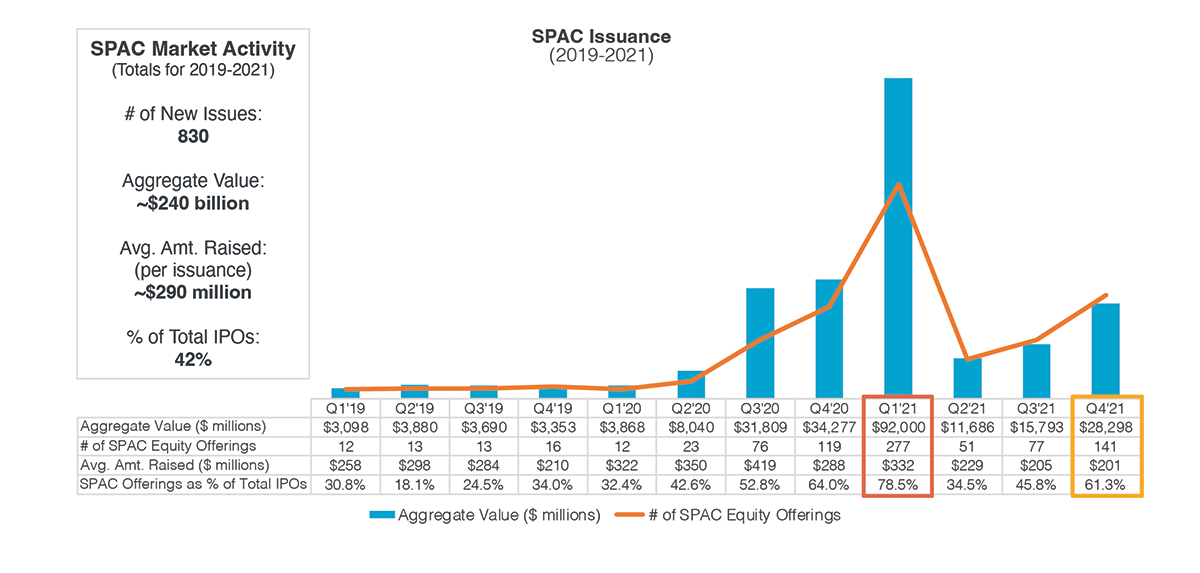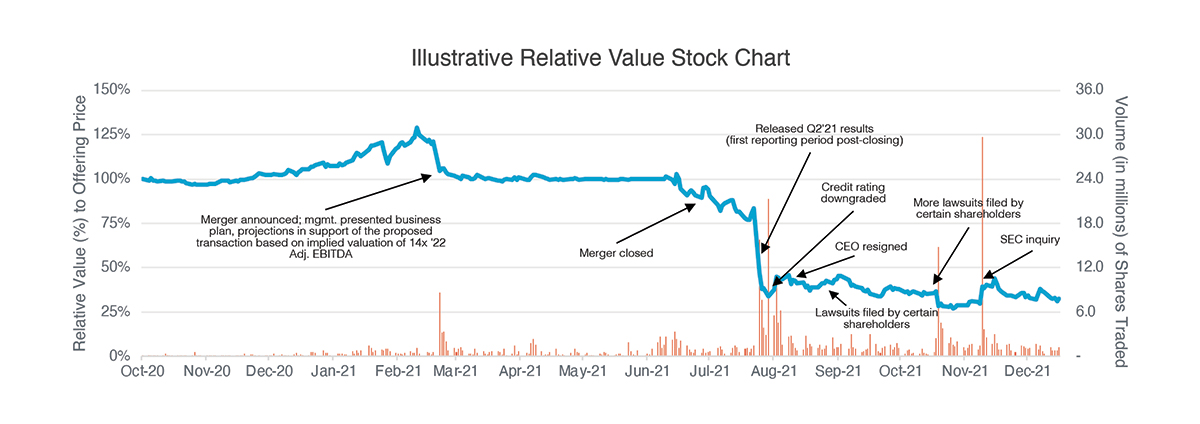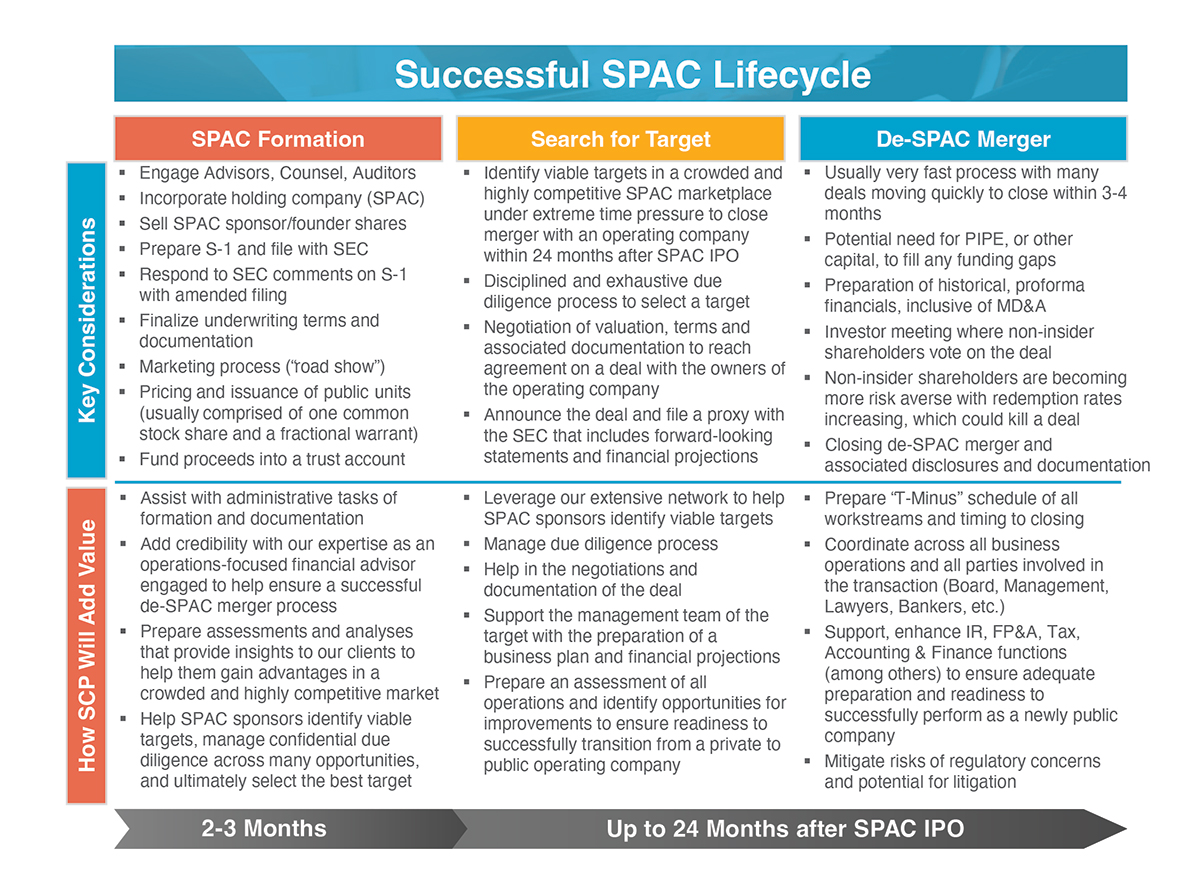
New SPAC Considerations Emerge for Market Participants
Going public through a Special Purpose Acquisition Company (SPAC), or a “blank check” company, is more efficient and cost-effective than the traditional IPO for many investors and private companies, provided all parties involved are disciplined throughout the process1. However, as SPAC issuance has grown in popularity, so too have instances of corner-cutting and wishful thinking, particularly in terms of valuations, on certain deals, which has brought regulatory attention to the market and will drive new considerations for SPAC market participants.
Speaking to the Healthy Markets Association Conference on December 9th, 2021 SEC Chairman Gary Gensler outlined a pair of questions that will guide how his agency approaches the SPAC market activity2:
- “Are SPAC investors — both at the time of the initial SPAC blank-check IPO and during the SPAC target IPO — benefiting from the protections they would get in traditional IPOs, with respect to disclosure, marketing practices, and gatekeepers?”
- “Further, are we mitigating the information asymmetries, fraud, and conflicts as best we can?”
With so many SPACs in the market now3, this competition for targets is driving valuations for deals higher which can be exciting for business owners and management teams at these SPAC targets. However, as the SEC casts a closer eye on this market activity, and opportunistic plaintiff’s lawyers capitalize on any mistakes, it is more vital than ever that SPAC market participants remain disciplined, and consider opportunities to proactively address these new challenges, or risk significant losses to shareholders.

SPAC Considerations: Maintain deal discipline and proactively address regulatory concerns and litigation risks
As advisers to middle-market companies, we at S7Clear have seen firsthand that many high-growth companies don’t necessarily have the same well-built finance function as mature public companies. At S7Clear, we support our clients in preparing ambitious yet achievable forward-looking projections, while helping to keep the company on the path to achieving them.
Regulators have taken notice of those instances of poor execution in SPAC deals that led to significant losses in shareholder value, and the SEC’s increasingly hawkish stance towards SPACs4 has led them to frequently launch inquiries into SPAC public disclosures and call for greater protections for non-insider investors. Additionally, litigators are proactively pushing class-action lawsuits against companies going public through a SPAC structure, claiming there are conflicts of interest inherent to SPACs, and insufficient protections for public investors5, an important new consideration for all public disclosures tied to any transaction involving a SPAC.
Fallout from a lack of discipline in a SPAC deal process, or insufficient preparation to transition successfully as a newly publicly traded company, has lowered risk tolerances for SPAC deals, especially with public investors, increasing the likelihood of shareholders voting against a deal by redeeming their shares. Consider that redemption rates have spiked recently, and in some cases, shareholder redemptions were so significant that they prevented some SPAC deals from closing (or required costly last-minute renegotiations).
Even when shareholders approve a deal, management must deliver on their business plan, which becomes more challenging while navigating the demands of being a newly public company. Failure to execute usually results in significant losses to shareholders, exodus of talented employees, and operational distress.
SPAC Considerations: What happens when discipline fails

Consider an illustrative example6 of what might happen when your business’ operations are not adequately prepared—or your management team not fully ready—to close on a de-SPAC merger. The management team of this company, with its stock performance charted above, stated in their first earnings release as a newly public company that they “were not yet able to calculate” certain expenses in their reported financial results for that period.
Immediately upon reporting that surprise, along with disappointing results, the stock price dropped dramatically (and remains roughly 70% lower than its peak value). Then, within days of that earnings release, the company’s CEO resigned (a permanent replacement has yet to be announced). There are now multiple shareholder-initiated lawsuits ongoing that allege public disclosures in support of the deal (as well as subsequently) were misleading in that management did not disclosure material information about the operations to the public. To cap it off, this company has received a request from the SEC for the voluntary production of documents relating to certain financial information previously disclosed to public investors.
The speed at which this business fell into distress raises questions. For instance, did this deal process distract management from running the business, preventing them from addressing issues that became problematic for the company and proliferated into distress? Did the investor relations and financial forecasting reporting functions lack the resources or sophistication to perform to the demands of a public company? Were there warning signs that would have been obvious with more comprehensive internal reporting of KPIs with frequent updates from management to the company’s board of directors?
While there are always circumstances that cannot be known as a third-party observer, it is clear this company has not had the start it envisioned in public markets, which likely stems a great deal from their lack of preparation, which led to huge losses for shareholders, litigation, and regulatory concerns.
How S7Clear can help you to address these many considerations for SPAC market participants
Our clients considering, or already involved with, a SPAC (inclusive of all SPAC sponsors and PIPE investors) must adapt to successfully navigate our increasingly precarious operating environment. The auditors, bankers and lawyers will all stress to a management team the value of a sophisticated FP&A team, but they can’t step in to build one for you. However, S7Clear can.
S7Clear will bring valuable resources to help you successfully navigate such a challenging transition across all functions in your business so that the entire company is fully prepared to operate effectively after going public7. Our collaborative approach and operating experience reinforce the credibility of public disclosure from our clients, which serves to bolster confidence with public investors in SPAC deals. These benefits are especially valuable now as SPACs are increasingly targeted by litigators and more likely to be investigated by regulators.

___________________________________________________________________________________________________________
1 “SPACs: The New IPO?” (Museum of American Finance, Virtual Panel, December 2021)
2 U.S. Securities & Exchange Commission, Remarks Before the Healthy Markets Association Conference (Dec. 9, 2021), from SEC Chair Gary Gensler.
3 See “SPAC Issuance” chart for SPAC Market Activity from Jan. 1, 2019 through Dec. 31, 2021;
(Based on the total number, and aggregate transaction value, of IPOs from “blank-check” companies)
Source: S&P Global Market Intelligence (S&P Capital IQ Pro – Transaction Statistics)
4 @GaryGensler
5 “Caution ahead: SPAC litigation trends provide a road map for directors and officers” (Source: Reuters)
6 Source: S&P Global Market Intelligence (S&P Capital IQ Pro – Annotated Stock Chart)




